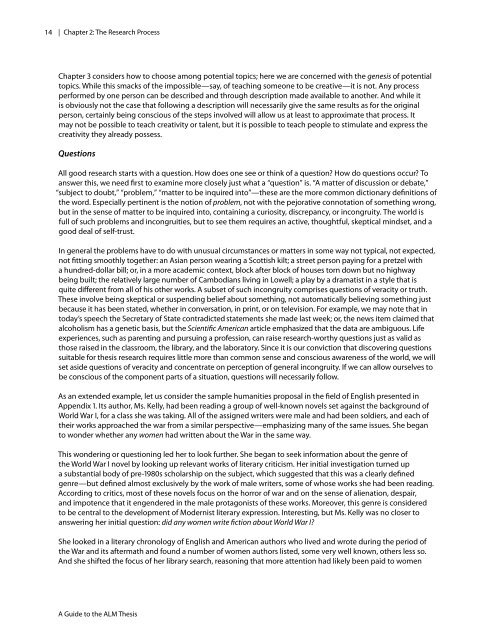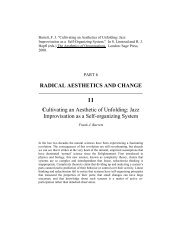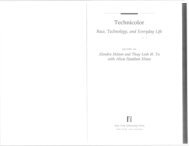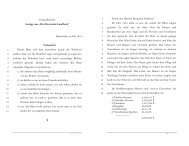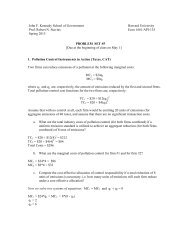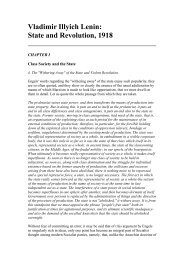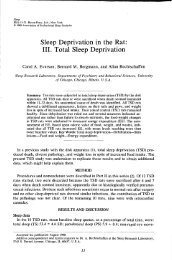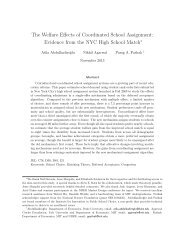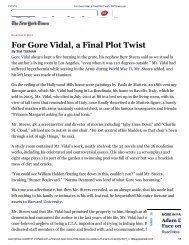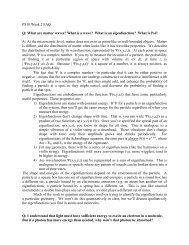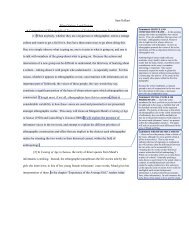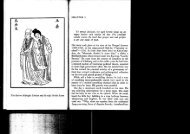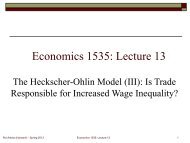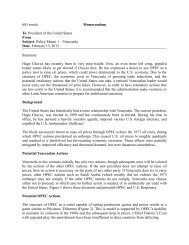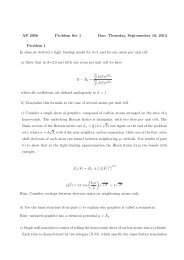A Guide to the ALM Thesis - iSites - Harvard University
A Guide to the ALM Thesis - iSites - Harvard University
A Guide to the ALM Thesis - iSites - Harvard University
Create successful ePaper yourself
Turn your PDF publications into a flip-book with our unique Google optimized e-Paper software.
14<br />
| Chapter 2: The Research Process<br />
Chapter 3 considers how <strong>to</strong> choose among potential <strong>to</strong>pics; here we are concerned with <strong>the</strong> genesis of potential<br />
<strong>to</strong>pics. While this smacks of <strong>the</strong> impossible—say, of teaching someone <strong>to</strong> be creative—it is not. Any process<br />
performed by one person can be described and through description made available <strong>to</strong> ano<strong>the</strong>r. And while it<br />
is obviously not <strong>the</strong> case that following a description will necessarily give <strong>the</strong> same results as for <strong>the</strong> original<br />
person, certainly being conscious of <strong>the</strong> steps involved will allow us at least <strong>to</strong> approximate that process. It<br />
may not be possible <strong>to</strong> teach creativity or talent, but it is possible <strong>to</strong> teach people <strong>to</strong> stimulate and express <strong>the</strong><br />
creativity <strong>the</strong>y already possess.<br />
Questions<br />
All good research starts with a question. How does one see or think of a question? How do questions occur? To<br />
answer this, we need first <strong>to</strong> examine more closely just what a “question” is. “A matter of discussion or debate,”<br />
“subject <strong>to</strong> doubt,” “problem,” “matter <strong>to</strong> be inquired in<strong>to</strong>”—<strong>the</strong>se are <strong>the</strong> more common dictionary definitions of<br />
<strong>the</strong> word. Especially pertinent is <strong>the</strong> notion of problem, not with <strong>the</strong> pejorative connotation of something wrong,<br />
but in <strong>the</strong> sense of matter <strong>to</strong> be inquired in<strong>to</strong>, containing a curiosity, discrepancy, or incongruity. The world is<br />
full of such problems and incongruities, but <strong>to</strong> see <strong>the</strong>m requires an active, thoughtful, skeptical mindset, and a<br />
good deal of self-trust.<br />
In general <strong>the</strong> problems have <strong>to</strong> do with unusual circumstances or matters in some way not typical, not expected,<br />
not fitting smoothly <strong>to</strong>ge<strong>the</strong>r: an Asian person wearing a Scottish kilt; a street person paying for a pretzel with<br />
a hundred-dollar bill; or, in a more academic context, block after block of houses <strong>to</strong>rn down but no highway<br />
being built; <strong>the</strong> relatively large number of Cambodians living in Lowell; a play by a dramatist in a style that is<br />
quite different from all of his o<strong>the</strong>r works. A subset of such incongruity comprises questions of veracity or truth.<br />
These involve being skeptical or suspending belief about something, not au<strong>to</strong>matically believing something just<br />
because it has been stated, whe<strong>the</strong>r in conversation, in print, or on television. For example, we may note that in<br />
<strong>to</strong>day’s speech <strong>the</strong> Secretary of State contradicted statements she made last week; or, <strong>the</strong> news item claimed that<br />
alcoholism has a genetic basis, but <strong>the</strong> Scientific American article emphasized that <strong>the</strong> data are ambiguous. Life<br />
experiences, such as parenting and pursuing a profession, can raise research-worthy questions just as valid as<br />
those raised in <strong>the</strong> classroom, <strong>the</strong> library, and <strong>the</strong> labora<strong>to</strong>ry. Since it is our conviction that discovering questions<br />
suitable for <strong>the</strong>sis research requires little more than common sense and conscious awareness of <strong>the</strong> world, we will<br />
set aside questions of veracity and concentrate on perception of general incongruity. If we can allow ourselves <strong>to</strong><br />
be conscious of <strong>the</strong> component parts of a situation, questions will necessarily follow.<br />
As an extended example, let us consider <strong>the</strong> sample humanities proposal in <strong>the</strong> field of English presented in<br />
Appendix 1. Its author, Ms. Kelly, had been reading a group of well-known novels set against <strong>the</strong> background of<br />
World War I, for a class she was taking. All of <strong>the</strong> assigned writers were male and had been soldiers, and each of<br />
<strong>the</strong>ir works approached <strong>the</strong> war from a similar perspective—emphasizing many of <strong>the</strong> same issues. She began<br />
<strong>to</strong> wonder whe<strong>the</strong>r any women had written about <strong>the</strong> War in <strong>the</strong> same way.<br />
This wondering or questioning led her <strong>to</strong> look fur<strong>the</strong>r. She began <strong>to</strong> seek information about <strong>the</strong> genre of<br />
<strong>the</strong> World War I novel by looking up relevant works of literary criticism. Her initial investigation turned up<br />
a substantial body of pre-1980s scholarship on <strong>the</strong> subject, which suggested that this was a clearly defined<br />
genre—but defined almost exclusively by <strong>the</strong> work of male writers, some of whose works she had been reading.<br />
According <strong>to</strong> critics, most of <strong>the</strong>se novels focus on <strong>the</strong> horror of war and on <strong>the</strong> sense of alienation, despair,<br />
and impotence that it engendered in <strong>the</strong> male protagonists of <strong>the</strong>se works. Moreover, this genre is considered<br />
<strong>to</strong> be central <strong>to</strong> <strong>the</strong> development of Modernist literary expression. Interesting, but Ms. Kelly was no closer <strong>to</strong><br />
answering her initial question: did any women write fiction about World War I?<br />
She looked in a literary chronology of English and American authors who lived and wrote during <strong>the</strong> period of<br />
<strong>the</strong> War and its aftermath and found a number of women authors listed, some very well known, o<strong>the</strong>rs less so.<br />
And she shifted <strong>the</strong> focus of her library search, reasoning that more attention had likely been paid <strong>to</strong> women<br />
A <strong>Guide</strong> <strong>to</strong> <strong>the</strong> <strong>ALM</strong> <strong>Thesis</strong>


